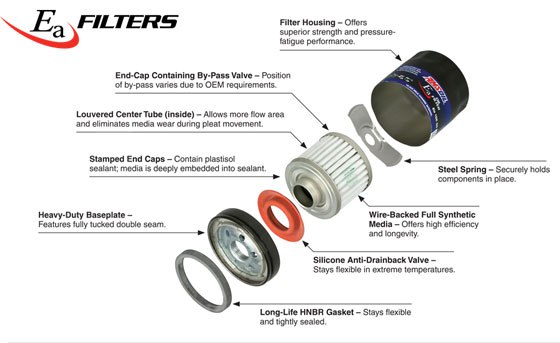Your Oil Filter Questions Answered
In theory, your oil filter has a simple job: capture wear-causing contaminants and hold them in the filter media so they don’t run amok throughout your engine.
But lots of factors can throw a wrench into this plan, which can raise questions about oil filters and filtration. Here are some of the most common.
Can I use the same oil filter twice?
The oil filter is designed to capture contaminants and hold them within the filter media. Over time, the media fills with dirt particles, agglomerated soot, metal particles and other junk. If the filter plugs, the pressure differential will open the bypass valve, which allows oil to bypass the filter, preventing oil starvation. Sure, dirty oil is preferable to no oil, but it’s not a long-term plan you can trust.
A new oil filter is far less expensive than a new engine. Don’t cheap-out – replace the filter with every oil change.
How long do oil filters last?
It depends on filter quality and your driving conditions.
A low-quality, cheap conventional filter doesn’t offer the capacity of a filter using synthetic media, meaning it fills with contaminants faster and requires more frequent changes. Plus, if you drive in dusty, dirty conditions, your engine is exposed to increased levels of airborne dirt particles that can enter the engine, especially if you haven’t changed the air filter in awhile or there’s a leak in the intake system.
Some modern direct-fuel-injection vehicles experience elevated fuel dilution, which also takes a toll on the oil filtration system. In diesel engines, soot particles can agglomerate into larger contaminants and lodge in the filter. This all adds up to more contaminants and more stress on the filter.
Follow the filter manufacturer’s service guidelines. If none are given, go with what’s recommended in your vehicle owner’s manual.
I forgot to change my oil filter when I changed oil. Is it too late?
No. Just change the filter as normal. After the new filter is installed, run the engine for a couple minutes, then shut it off and allow several minutes for the oil to settle in the sump. Check the oil level and top-off as needed to make-up for the oil removed with the old filter.
Should I pre-fill the oil filter before installing?
The Internet is full of pre-fillers and anti-pre-fillers, all of whom seem able to reference a high-mileage conversion van or pickup they’ve serviced for decades either pre-filling or never pre-filling the filter.
Some filter manufacturers say pre-filling the filter isn’t necessary. But remember – they make filters, not engines. There’s a reason engine manufacturers recommend 0W-XX or 5W-XX motor oils, and it’s so the oil flows readily at startup when it’s cold and the engine doesn’t go without vital lubrication while it builds oil pressure.
To help ensure the engine doesn’t start dry, we recommend you pre-fill the oil filter if you can. Horizontally oriented filters can pose a problem, but even they can be pre-filled with some oil. I typically pour a little oil into the filter and tip it sideways and check the oil inside. If there’s room for more before it begins to spill out of the opening in the filter, I add a little more oil before installing the filter.
Should I use a conventional or synthetic oil filter?
Use a filter made with synthetic media for best protection. Synthetic oil filters offer the following benefits:
- Increased efficiency – Efficiency describes the filter’s ability to capture contaminants. You can usually find a filter’s efficiency rating on the package or the manufacturer’s website. It’s reported as a percentage followed by a micron rating (e.g. “98.7 percent at 20 microns,” which is the efficiency of AMSOIL Ea® Oil Filters). It refers to the percentage of contaminants 20 microns and larger the filter traps in industry-standard (ASTM D4548-12) testing. The higher the percentage, the better.
- Increased capacity – Capacity refers to the amount of contaminants a filter can hold while still remaining effective. While there’s no industry-standard capacity rating, similar to the efficiency rating noted above, full synthetic media offers greater capacity than conventional media. The smaller fibers in synthetic media allow more room for contaminants to lodge without restricting oil flow.
- Improved durability – Hot oil slowly degrades the resins that hold some filter media together. Extreme temperatures also degrade the anti-drain valve and baseplate gasket. Use a filter with reinforcement on the media, such as a wire backing, to withstand increased heat and longer drain intervals. Look for an anti-drain valve made of silicone for maximum durability. This ensures the oil stays in the filter after the engine is shut off, preventing dry starts the next day.
What’s inside an oil filter?
Most spin-on oil filters contain the following:
- Filter media – the heart and soul of the filter. It’s where contaminants go to die. Once they lodge inside the filter media, they can’t circulate throughout your engine and cause wear.
- Anti-drain valve – prevents oil from draining out of the filter when you shut-off the engine, ensuring immediate oil pressure at startup.
- Gasket – technically it’s on the outside of the filter, but the gasket that creates a seal against the engine block is critical to preventing oil leaks.
For a more detailed view of an oil filter, check out this post.
Can I use synthetic oil with a conventional filter? Or vice versa?
Yes, it’s perfectly safe to use either type of filter with either type of oil. However, if you practice extended drain intervals using synthetic oil, a conventional oil filter may not offer the required service life, meaning you’ll have to change it in the middle of the oil drain interval, which is inconvenient. That’s why AMSOIL Ea Oil Filters are constructed to last 25,000 miles between changes, coinciding with the 25,000-mile drain interval of Signature Series Synthetic Motor Oil. AMSOIL Ea15K Oil Filters offer 15,000-mile change intervals.








